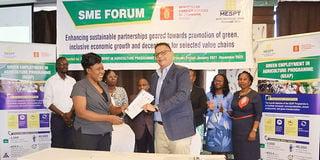'Our strategic direction at MESPT is to enable investment in agribusiness and promote green employment'
Sponsored by Micro Enterprises Support Programme Trust

MESPT and Keitt Exporters executives exchange a signed MoU outlining modalities of implementing the Green Employment in Agriculture Programme (GEAP).
By Rebecca Amukhoye
As the Micro Enterprises Support Programme Trust (MESPT) celebrate 20 years, it is also launching a new five-year programme titled Green Employment in Agriculture Programme (GEAP), funded by DANIDA – the Danish International Development Agency.
GEAP targets 40,000 smallholder farmers and will be implemented in 13 counties, namely Kilifi, Kwale, Nakuru, Nyandarua, Siaya, Kisii, Kakamega, Bungoma, Trans Nzoia, Uasin Gishu, Makueni, Machakos and Tana River.
The programme will facilitate increased commercialisation, decent employment, and green transformation through targeted interventions in 11 selected agriculture value chains that include, dairy, export vegetables, mango, avocado, indigenous chicken, coconut, aquaculture, pineapple, cassava and Moringa.
For two decades now, we have earned a reputation of building a more prosperous society by providing sustainable solutions that solve social, economic, and environmental challenges. Through our development model that enables smallholder farmers to access credit, increase agricultural productivity and reach markets, we play a critical role in financial inclusion and have implemented programmes that contribute to our country’s food security, as well as promoted interventions that conserve the environment and our natural resources.
Our existing programme portfolio has three key flagship programmes namely, AgriFI Food Safety System for Value Chain Competitiveness 2018 -2023, Danida Market Development Partnership (DMDP) Spurring Job Creation in Kenya by Enhancing the Competitiveness of the Banana Sub-Sector in Taveta 2020-2024, and the Green Employment in Agriculture Programme 2021-2025. Through the portfolio, we will continue to undertake strategies that contribute to increased access to credit for agribusiness Micro, Small and Medium Enterprises (MSMEs), as well as facilitating local and export market linkages for the farmers.
The focus on the agricultural sector is informed by its critical contribution to Kenya’s economic development, notably through informal employment creation, especially for the marginalised.
Agriculture is one of the key drivers of economic growth in Kenya, accounting for 35.4 percent of the GDP in 2019/2020, and 75 percent of the population earning all or part of their income from the sector.
The agriculture sector directly employs more than 40 percent of the total population, of which more than 70 percent are in rural areas. It also accounts for 65 percent of export earnings.
Despite its economic significance, the agricultural sector still struggles to attract sufficient funding due to real and perceived risks and competing returns in alternative sectors. This notwithstanding, we are grateful that we have development agencies and the government still supporting enablers of progress like MESPT, to implement interventions geared towards improving the livelihoods of smallholder farmers in Kenya.
Through our access to finance strategy, smallholder farmers and agri-SMEs will benefit from financial instruments that are affordable, flexible, patient and easy to access.
Moving forward, we are committed to expanding our impact, thus cascading innovation, enterprise, market-development strategies, and linkages, in addition to supporting and financing enterprises while promoting adoption of green solutions.
MESPT begun in 1997 as Micro Enterprises Support Programme (MESP), before being elevated into a Trust in 2002. With a seed capital of €4,417,000 (Ksh420 million then), MESPT started a wholesale loan portfolio with the objective of addressing the gap in affordable and accessible lending to the many unbanked groups, especially in rural Kenya.
Over the 20 years of its existence, MESPT has developed key competencies that have contributed to enterprising solutions that have impacted Kenya’s rural poor to increase their competitiveness in various agricultural value chains, leading to job creation and improved livelihoods.
MESPT implements its mandate through value chain and enterprise development, and financial services.
Key work streams involve building the capacity of value chain stakeholders, increasing agricultural productivity and food safety systems, facilitation of market linkages, and access to finance.
MESPT promotes the uptake of green interventions and services that contribute to a greener economy as well as advocating for an enabling environment in the food safety sub-sector in Kenya.
The writer is the Chief Executive Officer of the Micro Enterprises Support Programme Trust (MESPT)


